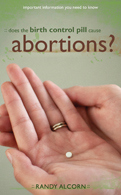 I read your book Does the Birth Control Pill Cause Abortions?, and I’ve found some recent medical literature that is relevant to your position on hormonal contraceptives.
I read your book Does the Birth Control Pill Cause Abortions?, and I’ve found some recent medical literature that is relevant to your position on hormonal contraceptives.
1. Müller AL, Llados C, Croxatto HB (2003) Postcoital treatment with levonorgestrel does not disrupt postfertilization events in the rat. Contraception, 67,415–419.
2. M.E. Ortiz R.E. Ortiz, M.A. Fuentes, V.H. Parraguez and H.B. Croxatto. Post-coital administration of levonorgestrel does not interfere with post-fertilization events in the new-world monkey Cebus paella. Human Reproduction, Vol. 19, No. 6, 1352-1356, June 2004.
Both of these articles show compelling research that hormonal birth control does not interfere with blastocyst implantation.
These studies say nothing about the COC (BCP) about which Randy Alcorn and I have written. They speak only to Emergency Birth Control (euphemistically called Emergency Contraception). If you would like to study more about that topic (what all the studies say, not just the two you’ve mentioned), may I suggest a systematic review on the topic?
C Kahlenborn, JB Stanford, and WL Larimore
Postfertilization effect of hormonal emergency contraception
The Annals of Pharmacotherapy: Vol. 36, No. 3, pp. 465-470. DOI 10.1345/aph.1A344
ABSTRACT:
OBJECTIVE: To assess the possibility of a postfertilization effect in regard to the most common types of hormonal emergency contraception (EC) used in the US and to explore the ethical impact of this possibility.
DATA SOURCES AND STUDY SELECTION: A MEDLINE search (1966-November 2001) was done to identify all pertinent English-language journal articles. A review of reference sections of the major review articles was performed to identify additional articles. Search terms included emergency contraception, postcoital contraception, postfertilization effect, Yuzpe regimen, levonorgestrel, mechanism of action, Plan B.
DATA SYNTHESIS: The 2 most common types of hormonal EC used in the US are the Yuzpe regimen (high-dose ethinyl estradiol with high-dose levonorgestrel) and Plan B (high-dose levonorgestrel alone). Although both methods sometimes stop ovulation, they may also act by reducing the probability of implantation, due to their adverse effect on the endometrium (a postfertilization effect). The available evidence for a postfertilization effect is moderately strong, whether hormonal EC is used in the preovulatory, ovulatory, or postovulatory phase of the menstrual cycle.
CONCLUSIONS: Based on the present theoretical and empirical evidence, both the Yuzpe regimen and Plan B likely act at times by causing a postfertilization effect, regardless of when in the menstrual cycle they are used. These findings have potential implications in such areas as informed consent, emergency department protocols, and conscience clauses.
The two animal studies you mentioned would not change the conclusions of this review of human data.




